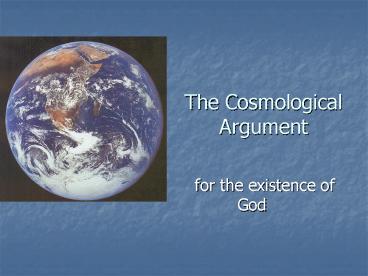The Cosmological Argument PowerPoint PPT Presentation
1 / 21
Title: The Cosmological Argument
1
The Cosmological Argument
- for the existence of God
2
Background
- The Cosmological Argument attempts to infer the
existence of God from the cosmos. - As such it is an a posteriori argument
- It is a synthetic and a deductive type of
argument
Cosmology is the study of the nature and the
order of the universe
3
Aquinas was not the first person to come up with
a form of the cosmological argument. He is
famous for the argument as his version is a
comprehensive (and Christian) one
4
Overview
In support
- Plato in Timaeus says that every
- created thing must be created by
- some cause
- Aristotle also talked of the need for a
- Creator as a cause
- Aquinas is best remembered for the
- popular form of the argument in the
- first three of his Five Ways
- Leibnitz in his 1710 book Theodicy
- argued that nothing takes place
- without sufficient reason
- Copleston famously supported the
- argument in a radio debate in 1947
- Swinburne is a modern supporter of
- the argument
Against
- David Hume proposed the classic
- criticisms in his Dialogues
- concerning Natural Religion
- Russell also criticised the argument
5
St Thomas Aquinas (1225-1275)
- Influential philosopher and theologian,
particularly for Roman Catholics - C13th showed a renewed interest in Aristotle, and
how philosophy could be useful for religion - Aquinas philosophy is often referred to as
Thomism - Aquinas was a prolific author.
- Summa Theologica is over 4000 pages long,
however only two pages relate to arguments for
the existence of God
6
Aquinas Five Ways
- In Summa Theologica Aquinas wrote about some of
the arguments for the existence of God. They are
fairly brief, and have come to be known as the
Five Ways - The Unmoved Mover
- The Uncaused Causer
- Possibility and Necessity
- Goodness, Truth and Nobility
- Teleological
These first three arguments are Variations of
the cosmological argument
All are a posteriori arguments as they have as
their starting point observation or experience of
the universe
7
The First WayThe Unmoved Mover
aka The Prime Mover or The Unchanged Changer
- There are many types of motion (change)
8
Change of size
9
Change of place
10
Change of state
Aquinas was most interested in changing state.
In changing state, movement is from potentiality
to actuality
11
Example given by Aquinas
- Wood is potentially hot
- For a piece of wood to become hot it has to be
changed by fire - What is potentially x is not actually x
- The actually x can only be produced by something
that is actually x - What ever is moved (changed) must be moved
(changed) by another, which was itself moved - Tracing back, we must arrive at a first mover,
moved by no other. This is what we understand to
be God. - Put formally, Everything that is in motion
(change) is moved (changed) by something else.
Infinite regress is impossible. Therefore there
must be a first mover (changer).
12
Sounds Like Aristotle to me..
13
- Question
- Did Aquinas believe that the universe had
- a beginning?
- He thought it did but said that it could not be
reasoned (it was revealed doctrine)
14
- With this form of the argument the emphasis is on
dependency. - In the twentieth century Swinburne took up this
argument - That God sustains the universe is a common
Christian belief. In other words, if God ceased
to exist, so would the universe. Therefore there
must be an initiator of change whose continued
existence is depended upon. This is a causal
relationship.
15
The Second WayThe Uncaused Causer (The First
Cause Argument)
- This argument is similar to the previous one but
cause is considered rather than motion.
16
The argument runs as follows
- Every effect has a cause
- Infinite regress is not possible
- Therefore there must be a first cause, which is
God
17
The Third WayPossibility and Necessity
(Contingency)
- Aquinas described every thing that had a property
as a being - All beings (things) in this world are created and
perish they are contingent items - If all beings are contingent then there must have
been a time when nothing existed - All beings cannot be contingent there must be a
necessary being God who brought things into
existence
18
To infinity, and beyond
19
Read Aquinas own words
- Summa Theologica
20
Terms to learn
- Cosmology
- Contingent/necessary
- Potentiality/actuality
- Big-Bang Theory
- Oscillating universe theory
- Kalam Argument
- Summa Theologica
- The Five Ways
- Creation ex nihilo
- Infinite regress
21
Further Reading
- Peter Cole Philosophy of Religion chapter 3
- A Jordan, N Lockyer, E Tate Philosophy of
Religion chapter 3 - Peter Vardy The Puzzle of God chapter 8

